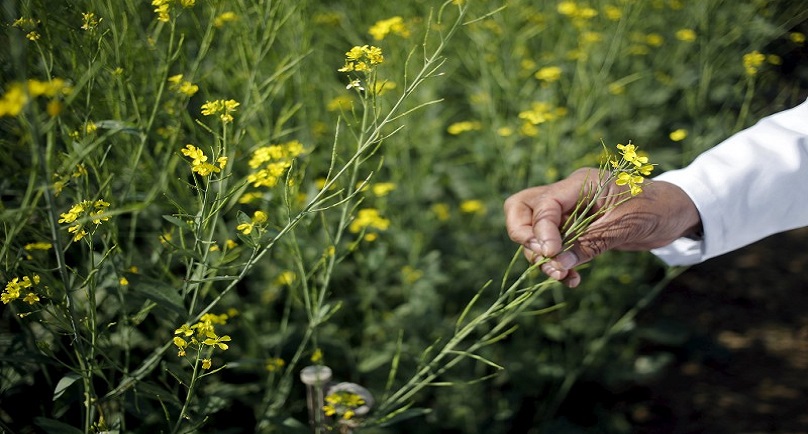Image: An Indian scientist holds a genetically modified (GM) rapeseed crop under trial in New Delhi, India, in this February 13, 2015 file photo. REUTERS/Anindito Mukherjee
By Krishna N. Das and Mayank Bhardwaj
NEW DELHI (Reuters) – Officials may decide on Friday whether to allow what could be India’s first genetically modified (GM) food crop, mustard, spurred by food security concerns and as China makes a big bet on the technology with a $43 billion bid for seed firm Syngenta.
Permitting GM food crops is a big call for a country that spends tens of billions of dollars importing edible oils and other food items every year.
Farmers are stuck with old technology, yields are at a fraction of global levels, cultivable land is shrinking and weather patterns have become less predictable.
Two straight droughts for the first time in three decades have made India a net importer of some food products for the first time in years.
If a commercial launch of GM mustard is allowed, it could pave the way for other food crops such as corn varieties developed by Monsanto, in one of the world’s biggest farm markets.
“I see this as a test case and I am hopeful,” said Deepak Pental, the lead scientist who used government grants to conduct tests on the oilseed crop over the past decade.
“How can we keep on running so scared when there is so much need for improving agricultural production?”
But even winning the panel’s approval is no guarantee that the GM crop would be introduced.
Political and public opposition to lab-altered food remains strong amid fears they could compromise food safety and biodiversity. There is also suspicion among farmers that their introduction would give foreign seed suppliers too much control.
“Why is the government imposing its decision on farmers on an unsafe and unproven technology, despite the availability of good varieties of mustard in our country?” Manish Sisodia, Delhi’s deputy chief minister, told Prime Minister Narendra Modi in a letter this week.
“We pray to you not to compromise our agriculture, citizens’ health and the environment under pressure from a handful of foreign companies.”
PRESSURE BUILDING?
Friday’s meeting, the third held to evaluate field trial data on GM mustard, is an indication of how serious Modi’s government is about pushing technology to lift food production after an impasse under the previous government halted research on transgenic crops.
A member of the GM approval committee comprising government and independent experts said they had already discussed the mustard in the past two meetings this year, and the next gathering would be crucial to deciding its future.
He declined to be named and did not give more details.
Ashok Gulati, a farm economist who advised the last government, said that China’s takeover of Swiss GM seed developer Syngenta should push the government into taking quick action.
“It’should come as … a wakeup call for India, which has to feed more than a billion mouths,” said Gulati. “India now doesn’t have the luxury to sit on the issue of GM. It just needs to take this bold and decisive step.”
India placed a moratorium on GM aubergine in 2010, fearing the effect on food safety and biodiversity. Field trials of other GM crops were not formally halted, but the regulatory system was brought to a deadlock after that.
However, Modi, who was instrumental in making Gujarat state the leading user of GM cotton in India when he was chief minister, cleared several field trials soon after taking office in New Delhi in 2014.
Some grassroots groups associated with Modi’s nationalist Bharatiya Janata Party have opposed GM crops because of the reliance on seeds patented by multinationals like Monsanto, DuPont, Dow Chemical and Syngenta.
But New Delhi-based Pental said the mustard variety was developed by Indian scientists, and local firms could easily supply farmers with cheap seeds.
TESTS REVEAL NO PROBLEMS
The government’s chief scientific adviser, R. Chidambaram, has also asked Modi for a quick decision on the issue.
A senior environment ministry official, who is a member of the GM approval committee, had said earlier that studies found no ill effects from GM foods.
Pental’s mustard makes use of three genes already incorporated in rapeseed hybrids in Canada, the United States and Australia and extensive biosafety tests have revealed no cause for concern, according to a copy of the field trial report submitted to the government and seen by Reuters.
Additionally, oil derived from its seeds does not contain proteins linked to the three genes used, Pental said.
The mustard’s yield is up to 38 percent higher than normal varieties, which would help Modi slash an annual bill for vegetable oil imports of more than $10 billion.
A farm ministry official said they were keen to roll out any innovation that can help farmers produce more, as long as concerns of human and soil health are addressed.
(Editing by Mike Collett-White)
Copyright 2015 Thomson Reuters. Click for Restrictions.


